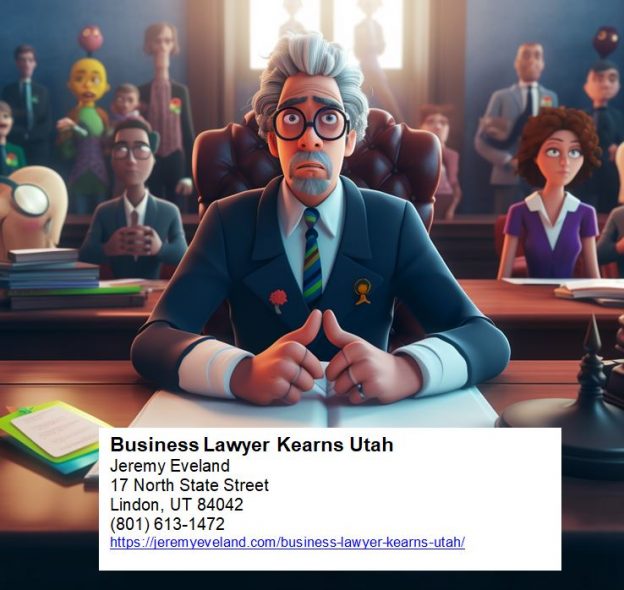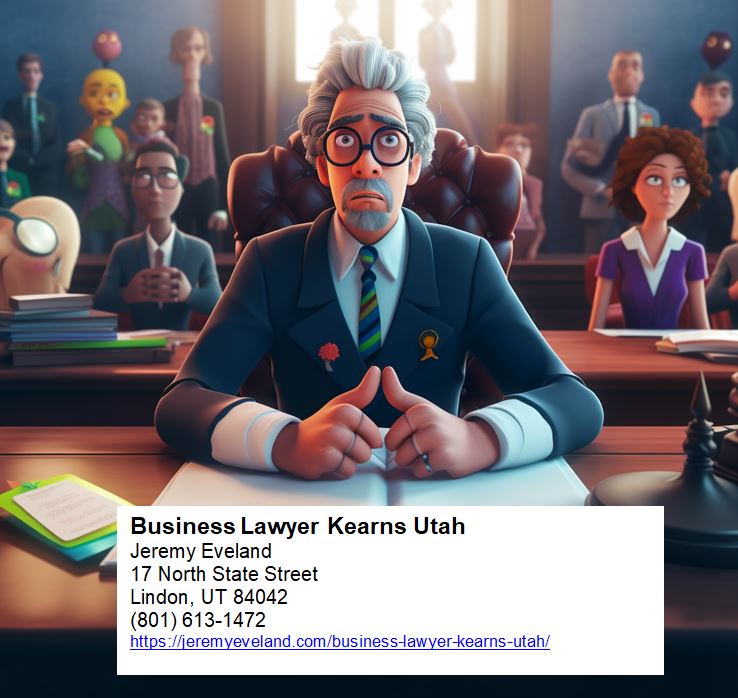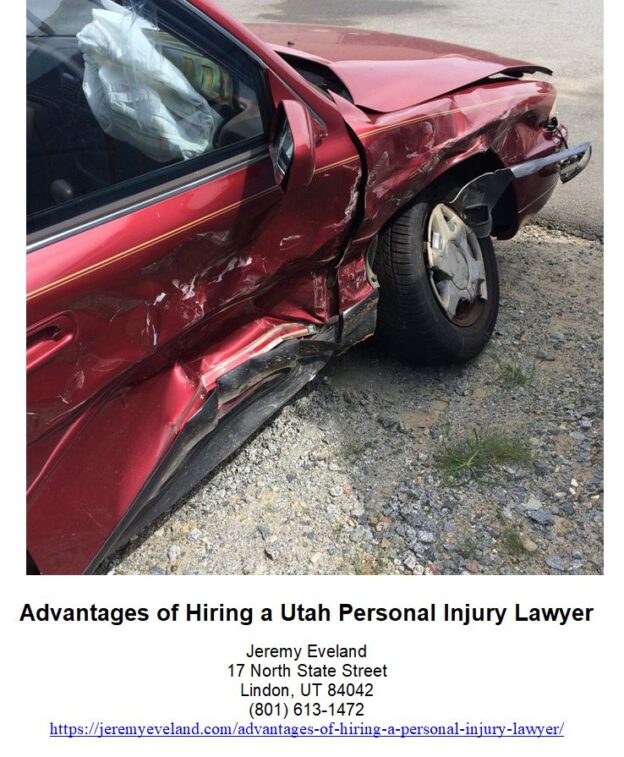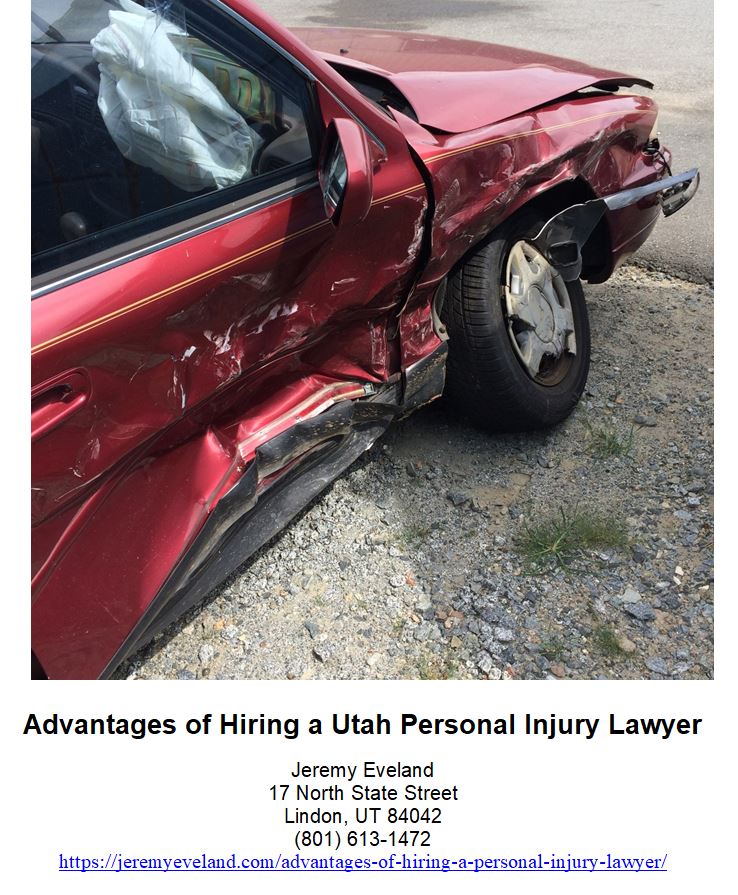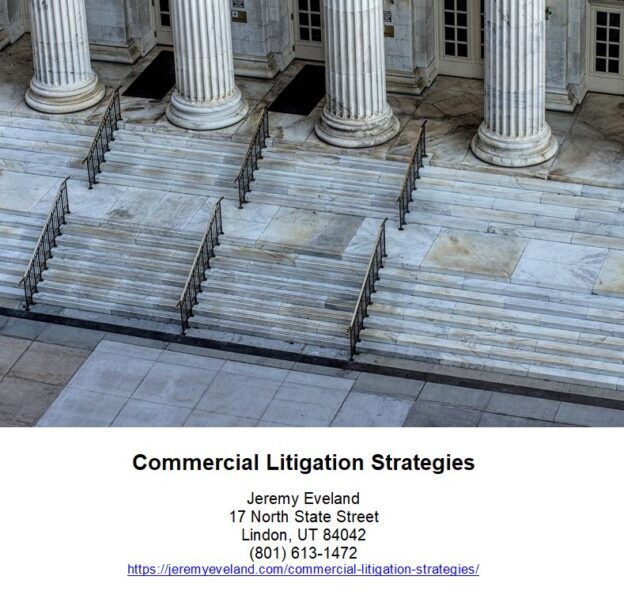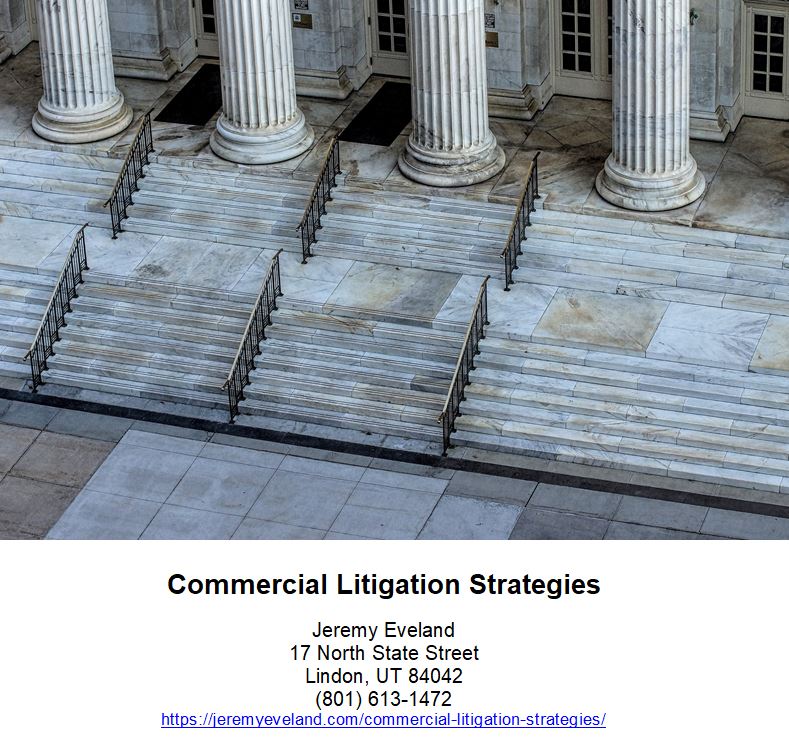Business Law is a complex and constantly evolving area of law that is essential for the success of any business. It covers a wide range of legal issues, including contracts, employment law, intellectual property, and liability, among others. Given the importance of these legal issues, businesses in Kearns, Utah need to have a qualified and experienced business lawyer to provide legal advice, guidance, and representation.
A business lawyer in Kearns, Utah is a professional who specializes in the legal aspects of running a business. They are trained to help business owners understand and comply with the laws and regulations that govern their operations. They also provide legal advice and representation on a variety of legal matters that businesses may encounter, including contract disputes, employment disputes, and intellectual property issues.
The roles and responsibilities of a business lawyer in Kearns, Utah are numerous and varied. They are responsible for providing legal advice and guidance to businesses on a wide range of legal issues. This includes advising businesses on the proper legal structure for their operations, reviewing and drafting contracts, and representing businesses in legal disputes. They also help businesses comply with regulatory requirements and ensure that all necessary legal documents and filings are filed correctly and promptly. In addition, business lawyers in Kearns, Utah play a critical role in advising businesses on mergers, acquisitions, and partnerships, helping to ensure that these transactions are completed in a legally sound and effective manner.
To be an effective business lawyer in Kearns, Utah, a person must possess several key qualifications and skills. Firstly, they must have a strong legal education and training, typically having earned a law degree and passed the bar exam. Secondly, they must have substantial experience in the practice of business law, which includes understanding the legal issues that businesses face and how to address them. Additionally, they must have excellent communication and negotiation skills, as they will often be called upon to interact with clients, opposing counsel, and government agencies. Furthermore, they must have the ability to manage complex legal matters, including conducting legal research, preparing legal documents, and negotiating settlements. Finally, they must have a thorough knowledge of local and federal laws that govern business operations in Kearns, Utah.
Many types of businesses can benefit from the services of a business lawyer in Kearns, Utah. Small businesses, startups, corporations, non-profit organizations, and limited liability companies (LLCs) are among the many types of businesses that can benefit from the expertise of a business lawyer. These businesses face a wide range of legal issues and challenges, and a business lawyer can provide valuable guidance and representation to help them navigate these challenges and achieve success.
To hire a business lawyer in Kearns, Utah, it is important to take the time to research potential candidates. This may involve asking for referrals and recommendations from other business owners and conducting online research to identify lawyers with the necessary qualifications and experience. Once you have identified a list of potential candidates, it is important to review their credentials and experience to determine which lawyer is best suited to meet your legal needs. You should also schedule a consultation to discuss your legal needs and to determine whether the lawyer is a good fit for your business. Finally, it is important to choose a lawyer who meets your legal needs, budget, and communication style.
In conclusion, a business lawyer in Kearns, Utah is an essential resource for businesses of all sizes and types. They provide legal advice and representation on a wide range of legal issues and help businesses comply with regulatory requirements and avoid legal disputes. With the right qualifications, experience, and skills, a business lawyer can help businesses in Kearns, Utah achieve success and growth.
Role and Responsibilities of a Business Lawyer in Kearns, Utah
The role and responsibilities of a business lawyer in Kearns, Utah can vary depending on the size and type of business they are representing. However, generally speaking, business lawyers in Kearns, Utah play a crucial role in providing legal advice and representation on a wide range of legal issues that businesses may face. Some of the key responsibilities of a business lawyer in Kearns, Utah include:
Legal Advice and Guidance: Business lawyers in Kearns, Utah provide legal advice and guidance to their clients on a wide range of legal issues, including contracts, employment law, intellectual property, and liability, among others. They help businesses understand the laws and regulations that govern their operations and advise them on the best course of action to take.
Contract Drafting and Review: Business lawyers in Kearns, Utah are responsible for reviewing and drafting contracts for their clients. This includes employment contracts, supplier contracts, and customer contracts, among others. They ensure that these contracts are legally binding and protect the interests of their clients.
Representation in Legal Disputes: Business lawyers in Kearns, Utah represent their clients in legal disputes, including contract disputes, employment disputes, and intellectual property disputes, among others. They provide their clients with the legal representation they need to achieve a favorable outcome in these disputes.
Legal Compliance and Regulatory Issues: Business lawyers in Kearns, Utah help their clients comply with the various laws and regulations that govern their operations. This includes advising on tax laws, employment laws, and environmental laws, among others. They help their clients avoid legal disputes and penalties by ensuring that they comply with the law.
Mergers, Acquisitions, and Partnerships: Business lawyers in Kearns, Utah play a critical role in advising businesses on mergers, acquisitions, and partnerships. They help their clients navigate the complex legal issues associated with these transactions, including due diligence, negotiation, and drafting of legal agreements, among others.
In summary, the role and responsibilities of a business lawyer in Kearns, Utah are diverse and encompass a wide range of legal issues. They play a crucial role in advising businesses on the law and providing representation in legal disputes, helping their clients achieve success and growth.
Qualifications and Skills of a Business Lawyer in Kearns, Utah
To be a successful business lawyer in Kearns, Utah, one must possess a specific set of qualifications and skills. Some of the key qualifications and skills of a business lawyer in Kearns, Utah include:
Legal Education:
Business lawyers in Kearns, Utah must have a Juris Doctor (J.D.) degree from an accredited law school and be licensed to practice law in the state of Utah. This requires completing a rigorous legal education that covers a wide range of legal topics and subjects.
Business Acumen:
Business lawyers in Kearns, Utah must have a strong understanding of business and commerce, including finance, economics, and accounting. They must have the ability to understand complex business issues and advise their clients on the best course of action to take.
Excellent Communication Skills:
Business lawyers in Kearns, Utah must have excellent written and verbal communication skills. They must be able to communicate complex legal concepts and ideas to their clients clearly and concisely, and e able to negotiate effectively on their client’s behalf.
Attention to Detail:
Business lawyers in Kearns, Utah must have a keen eye for detail and be able to review and analyze complex legal documents. They must be able to identify potential legal issues and take steps to address them before they become major problems.
Problem-Solving Skills:
Business lawyers in Kearns, Utah must have excellent problem-solving skills and be able to find creative solutions to complex legal problems. They must be able to think critically and analytically and find innovative ways to resolve disputes and achieve their client’s goals.
Ethical Conduct:
Business lawyers in Kearns, Utah must adhere to the highest ethical standards and be committed to providing their clients with honest and fair representation. They must be able to act with integrity and maintain their clients’ confidential information.
In conclusion, to be a successful business lawyer in Kearns, Utah, one must possess a strong combination of legal education, business acumen, excellent communication skills, attention to detail, problem-solving skills, and ethical conduct. These qualities and skills are critical for providing effective legal representation to businesses and achieving positive outcomes for their clients.
Types of Businesses That Can Benefit from a Business Lawyer in Kearns,
A variety of businesses in Kearns, Utah can benefit from the services of a business lawyer. Some of the types of businesses that can benefit from the services of a business lawyer in Kearns, Utah include:
Small Businesses:
Small businesses in Kearns, Utah often face a range of legal issues, including contract disputes, employment disputes, and liability issues, among others. A business lawyer can help small businesses navigate these legal issues and provide advice on the best course of action to take.
Startups: Startups in Kearns, Utah face unique legal challenges, including intellectual property protection, venture capital financing, and employment law issues, among others. A business lawyer can help startups understand the legal issues they face and provide guidance on how to address these issues.
E-Commerce Businesses:
E-commerce businesses in Kearns, Utah face a range of legal issues, including data privacy, intellectual property, and consumer protection, among others. A business lawyer can help e-commerce businesses understand these legal issues and provide guidance on how to address them.
Real Estate Businesses:
Real estate businesses in Kearns, Utah face a range of legal issues, including contracts, zoning laws, and property disputes, among others. A business lawyer can help real estate businesses understand these legal issues and provide guidance on how to address them.
Manufacturing and Distribution Businesses: Manufacturing and distribution businesses in Kearns, Utah face a range of legal issues, including contracts, liability, and intellectual property, among others. A business lawyer can help these businesses understand these legal issues and provide guidance on how to address them.
In conclusion, businesses of all sizes and types in Kearns, Utah can benefit from the services of a business lawyer. Business lawyers in Kearns, Utah can provide legal advice and representation on a wide range of legal issues, helping businesses navigate the complex legal landscape and achieve success and growth.
How to Hire a Business Lawyer in Kearns, Utah
Here are some steps you can follow to hire a business lawyer in Kearns, Utah:
Identify Your Legal Needs: The first step in hiring a business lawyer in Kearns, Utah is to determine your legal needs. Consider the types of legal issues your business is facing, and identify the areas where you need legal assistance.
Research and Gather Referrals: Once you have identified your legal needs, research and gather referrals to find qualified business lawyers in Kearns, Utah. You can ask for referrals from other businesses, use online directories or websites, or consult with the Utah State Bar Association.
Schedule Consultations:
Schedule consultations with a few business lawyers in Kearns, Utah. During the consultation, ask questions about their experience, qualifications, and fees, and assess their ability to meet your legal needs.
Check Credentials and References: Before hiring a business lawyer in Kearns, Utah, check their credentials and references. Ensure that they are licensed to practice law in the state of Utah and that they have a good reputation and track record of success in representing businesses.
Review the Contract:
Once you have selected a business lawyer in Kearns, Utah, review the contract or engagement letter carefully. Ensure that the terms of the agreement are clear and that you understand the services the lawyer will provide and their fees.
In conclusion, hiring a business lawyer in Kearns, Utah requires careful research and due diligence. By following these steps, you can find a qualified and experienced business lawyer who can provide effective legal representation and support your business’s success.
The services of a business lawyer are essential for businesses of all sizes and types in Kearns, Utah. Business lawyers in Kearns, Utah can provide legal advice and representation on a wide range of legal issues, helping businesses navigate the complex legal landscape and achieve success and growth. Hiring a business lawyer in Kearns, Utah requires careful research and due diligence, but by following the steps outlined, you can find a qualified and experienced business lawyer who can meet your legal needs and support your business’s success. Whether you are a small business owner, a startup, an e-commerce business, a real estate business, or a manufacturing or distribution business, a business lawyer in Kearns, Utah can provide valuable legal support and help you achieve your goals.
Navigating the Legal Landscape: The Importance of Business Lawyers in Kearns, Utah
The Importance of Business Lawyers in Today’s World
Business lawyers play a crucial role in the success of businesses today. These legal professionals provide guidance on many legal issues that businesses face, such as employment law, contracts and agreements, intellectual property law, and corporate governance. Without the help of business lawyers, companies would be left to navigate the complex legal landscape on their own, which could lead to costly mistakes and potentially disastrous consequences.
Kearns, Utah is an excellent location for businesses looking for reliable legal services. As a growing city with a thriving business community, Kearns has many experienced lawyers who specialize in helping businesses navigate the complexities of modern business law.
These professionals provide tailored legal advice and representation to ensure that companies can operate confidently within the bounds of the law. In addition to providing general legal support for businesses, lawyers in Kearns also offer specialized expertise in areas such as employment law and commercial litigation.
This means that local businesses can find knowledgeable representation no matter what specific challenges they may be facing. With this level of support available right here in their own community, Kearns businesses can feel confident that they are well-protected from any potential legal threats.
What is a Business Lawyer?
Business lawyers, also known as corporate lawyers or commercial lawyers, are legal professionals who specialize in providing comprehensive legal services to businesses of all sizes. They help businesses navigate the complex landscape of laws and regulations that govern business operations.
Business lawyers serve a variety of functions, from providing advice on legal matters to negotiating contracts and representing clients in court. Business lawyers can work in private practice, as part of a law firm or independently.
They can also work for corporations, government agencies or non-profit organizations. Their primary role is to provide legal guidance and representation to companies with regards to their operations, transactions, and interactions with other parties.
The Role of Business Lawyers
Business lawyers play a vital role in the success of any business venture. They advise clients on various legal issues that affect their operations, including contracts, intellectual property rights, mergers and acquisitions, employment law issues and corporate governance matters. One important function that business lawyers perform is assisting companies in complying with the various laws and regulations that govern their operations.
These include tax laws, employment laws, environmental regulations and consumer protection rules. Failure to comply with these laws could result in significant fines or even criminal charges.
Why Businesses Need Legal Representation
In today’s complex business environment, it’s essential for companies to have reliable legal representation. Whether they’re dealing with regulatory compliance issues or negotiating contracts with suppliers or customers, having an experienced business lawyer by their side can make all the difference. One reason why businesses need legal representation is to protect themselves against potential lawsuits or other legal problems that could harm their reputation or bottom line.
A good business lawyer can help prevent these problems by identifying potential risks early on and taking steps to mitigate them before they become major issues. Another reason why businesses need legal representation is for guidance when making important decisions about company strategy and direction.
Business lawyers can provide valuable insight and advice on a wide range of matters, from mergers and acquisitions to product development and marketing strategies. This guidance can help businesses make informed decisions that will benefit them in the long run.
The Role of a Business Lawyer in Kearns, Utah
Specific Services Offered by Business Lawyers in Kearns, Utah
Business lawyers in Kearns, Utah offer a wide range of legal services to businesses. These services vary depending on the needs of the business.
Some common legal services offered by business lawyers include contract drafting and review, employment law guidance, intellectual property protection, and mergers and acquisitions. Contract drafting and review is one of the most common services provided by business lawyers.
Businesses often need contracts for various purposes such as employment agreements, supplier contracts, and customer agreements. A business lawyer can draft these contracts to ensure that they meet legal requirements and protect the interests of the business.
Another important service offered by business lawyers in Kearns, Utah is guidance on employment law matters. This includes advising businesses on issues such as employee classifications (exempt vs non-exempt), wage and hour laws compliance, anti-discrimination laws compliance, and termination procedures.
Intellectual property protection is another area where businesses may seek assistance from a lawyer. This includes protecting trademarks, copyrights, patents or trade secrets through registration or litigation.
The Benefits of Having a Local Business Lawyer
Having a local business lawyer who understands the unique needs of businesses in Kearns, Utah can be invaluable for several reasons. First off they are familiar with local laws which could impact your business operations or decisions; secondly they may have relationships with other local professionals that could help your company; thirdly it’s much easier to work closely with someone who’s within driving distance. Being able to have face-to-face meetings with your lawyer is also crucial when it comes to developing trusting relationships which are necessary for transparent communication between attorney and client.
A local attorney can attend meetings with clients within minutes instead of hours spent traveling across town or state lines. In addition to these benefits mentioned above there is also the advantage of having someone who understands the local business community.
A business lawyer in Kearns, Utah can provide valuable insights into how to approach legal issues from a local perspective and offer guidance on networking with other businesses in the area. They may also have experience in dealing with local regulatory bodies like zoning boards or city councils that could affect your business’s operations.
Areas of Expertise
Corporate Law
One area of expertise that business lawyers in Kearns, Utah specialize in is corporate law. Corporate law encompasses a wide range of legal issues related to businesses, including formation, governance, and dissolution. A skilled corporate lawyer can assist businesses with drafting and filing articles of incorporation or organization, developing bylaws and operating agreements, conducting shareholder meetings, and advising on compliance matters.
In addition to these basic services, a business lawyer specializing in corporate law can also assist with more complex matters such as mergers and acquisitions. For example, if a company is considering acquiring another company or merging with another business entity, a knowledgeable corporate lawyer can help navigate the legal complexities involved in negotiating and finalizing the deal while protecting their clients’ interests.
Intellectual Property Law
Another important area of expertise for business lawyers in Kearns, Utah is intellectual property law. Intellectual property refers to creations of the mind such as inventions, literary works, symbols or designs that are used by individuals or companies to create value for themselves. Intellectual property laws protect these creations from unauthorized use by others.
A qualified business lawyer specializing in intellectual property can assist businesses with securing patents for their inventions and trademarks for their unique brand identities. If another party infringes on a company’s intellectual property rights by violating their patents or trademarks through copying or stealing them for commercial purposes without permission from the rightful owner(s), an experienced intellectual property lawyer will take swift legal action to protect their client’s interests.
Tax Law
Tax law is an essential area of expertise that business lawyers in Kearns Utah are well-versed in. With ever-changing tax legislation at both federal and state levels; it’s imperative that corporations have guidance through planning strategies while maintaining compliance with tax codes.
Having an experienced business lawyer to assist in matters of tax law can save businesses money, time and stress by ensuring that they are complying with all relevant regulations as well as properly structuring their financial affairs to take maximum advantage of available tax breaks and incentives. A good business lawyer specializing in tax law will also represent their clients’ interests in any disputes or audits with the Internal Revenue Service or Utah state taxation agencies.
Overall, businesses in Kearns, Utah can benefit greatly from the diverse areas of expertise offered by qualified business lawyers. Whether it’s through corporate law, intellectual property law, tax law or other specialized areas; having reliable legal counsel is critical to success.
Choosing the Right Business Lawyer
Experience Matters
When choosing a business lawyer in Kearns, Utah, one of the most important factors to consider is their experience. A lawyer who has been practicing for several years will have a better understanding of the legal system and how to navigate it successfully.
They will also have gained valuable knowledge and insights from previous cases that can be applied to your business. During your initial consultation with a potential lawyer, be sure to ask about their experience in dealing with cases similar to yours.
Ask how they would approach your specific situation and what strategies they would use to achieve a favorable outcome. A good lawyer will be able to provide you with clear and concise answers that demonstrate their expertise.
Reputation Matters
Another important factor to consider when choosing a business lawyer is their reputation. You want a lawyer who is known for their honesty, integrity, and professionalism. Look for reviews online or ask for references from past clients.
A reputable lawyer will have no problem providing you with this information. Additionally, it’s important to choose a lawyer who has a good reputation in the local community.
This can be especially beneficial if you are dealing with legal issues that involve local laws or regulations. A respected local attorney may have relationships or connections within the community that could work to your advantage.
Communication Skills Matter
When choosing a business lawyer in Kearns, Utah, communication skills are crucial. Your attorney should be able to explain complex legal concepts in simple terms and keep you informed throughout every step of the process.
They should also be responsive and easy to get in touch with when you have questions or concerns. During your initial consultation, pay attention to how well the attorney communicates with you.
Do they listen carefully and answer your questions fully? Do they seem genuinely interested in helping you?
If not, it may be a red flag that they are not the right lawyer for you. Choosing the right business lawyer in Kearns, Utah is essential for any successful company.
Factors such as experience, reputation, and communication skills should be carefully considered before making a decision. Take the time to research potential lawyers and schedule consultations to find the one who is best suited to your specific needs.
Conclusion
Why having a business lawyer is essential for any successful company
Having a business lawyer is essential for any successful company. The legal landscape of the business world can be complicated and ever-changing, making it difficult to navigate on your own. A good business lawyer will provide sound legal advice and guidance that can help you make better decisions.
They will also work to protect your company’s interests and ensure that you comply with all relevant laws and regulations. Having a business lawyer is particularly important when it comes to dealing with legal disputes.
In the event of a lawsuit or other legal dispute, a good lawyer can help you avoid costly mistakes and fight for your rights in court. They can also help you negotiate settlements or other agreements outside of court, which can save you time, money, and stress.
Encouraging businesses in Kearns, Utah to seek out legal representation from reputable local lawyers
For businesses located in Kearns, Utah, seeking out legal representation from reputable local lawyers is highly recommended. Local lawyers have specific knowledge of the unique needs and challenges facing businesses in the area. They are also more accessible than lawyers from outside the area who may not be familiar with local laws or customs.
When choosing a local lawyer, it’s important to do your research and find someone who has experience working with businesses similar to yours. Look for someone who has a good reputation within the community and who communicates well with clients.
Ultimately, investing in quality legal representation is an investment in the long-term success of your business. By working closely with a knowledgeable attorney who understands your needs as a business owner, you can achieve greater peace of mind knowing that your company is well-protected against potential legal threats or challenges.
Areas We Serve
We serve individuals and businesses in the following locations:
Salt Lake City Utah
West Valley City Utah
Provo Utah
West Jordan Utah
Orem Utah
Sandy Utah
Ogden Utah
St. George Utah
Layton Utah
South Jordan Utah
Lehi Utah
Millcreek Utah
Taylorsville Utah
Logan Utah
Murray Utah
Draper Utah
Bountiful Utah
Riverton Utah
Herriman Utah
Spanish Fork Utah
Roy Utah
Pleasant Grove Utah
Kearns Utah
Tooele Utah
Cottonwood Heights Utah
Midvale Utah
Springville Utah
Eagle Mountain Utah
Cedar City Utah
Kaysville Utah
Clearfield Utah
Holladay Utah
American Fork Utah
Syracuse Utah
Saratoga Springs Utah
Magna Utah
Washington Utah
South Salt Lake Utah
Farmington Utah
Clinton Utah
North Salt Lake Utah
Payson Utah
North Ogden Utah
Brigham City Utah
Highland Utah
Centerville Utah
Hurricane Utah
South Ogden Utah
Heber Utah
West Haven Utah
Bluffdale Utah
Santaquin Utah
Smithfield Utah
Woods Cross Utah
Grantsville Utah
Lindon Utah
North Logan Utah
West Point Utah
Vernal Utah
Alpine Utah
Cedar Hills Utah
Pleasant View Utah
Mapleton Utah
Stansbury Par Utah
Washington Terrace Utah
Riverdale Utah
Hooper Utah
Tremonton Utah
Ivins Utah
Park City Utah
Price Utah
Hyrum Utah
Summit Park Utah
Salem Utah
Richfield Utah
Santa Clara Utah
Providence Utah
South Weber Utah
Vineyard Utah
Ephraim Utah
Roosevelt Utah
Farr West Utah
Plain City Utah
Nibley Utah
Enoch Utah
Harrisville Utah
Snyderville Utah
Fruit Heights Utah
Nephi Utah
White City Utah
West Bountiful Utah
Sunset Utah
Moab Utah
Midway Utah
Perry Utah
Kanab Utah
Hyde Park Utah
Silver Summit Utah
La Verkin Utah
Morgan Utah
Business Lawyer Kearns Utah Consultation
When you need help from a business lawyer near Kearns, Utah call Jeremy D. Eveland, MBA, JD (801) 613-1472 for a consultation.
Jeremy Eveland
17 North State Street
Lindon UT 84042
(801) 613-1472
Related Posts
Does Starting My Own Business Mean I Get A Corporation Automatically?
Impact of Environmental Regulations on Business Law Compliance
Business Lawyer South Jordan Utah
Business Lawyer Millcreek Utah
Business Lawyer Taylorsville Utah
How Artificial Intelligence is Shaping the Future of Business Law
Estate Planning is Crucial for People of All Income Levels
Navigating Legal Challenges in Business Succession Planning
Business Lawyer Bountiful Utah
How To Structure A Merger Or Acquisition In Utah
How To Hire Employees Legally in Utah
10 Tips for Negotiating Lease Agreements
Business Lawyer Spanish Fork Utah
How To Start A Non-Profit In Utah
What are the Trademark Laws in Utah
Business Lawyer Pleasant Grove Utah
[geocentric_weather id=”14256d53-ad38-4804-9570-1648f101bad1″]
[geocentric_about id=”14256d53-ad38-4804-9570-1648f101bad1″]
[geocentric_neighborhoods id=”14256d53-ad38-4804-9570-1648f101bad1″]
[geocentric_thingstodo id=”14256d53-ad38-4804-9570-1648f101bad1″]
[geocentric_busstops id=”14256d53-ad38-4804-9570-1648f101bad1″]
[geocentric_mapembed id=”14256d53-ad38-4804-9570-1648f101bad1″]
[geocentric_drivingdirections id=”14256d53-ad38-4804-9570-1648f101bad1″]
[geocentric_reviews id=”14256d53-ad38-4804-9570-1648f101bad1″]
